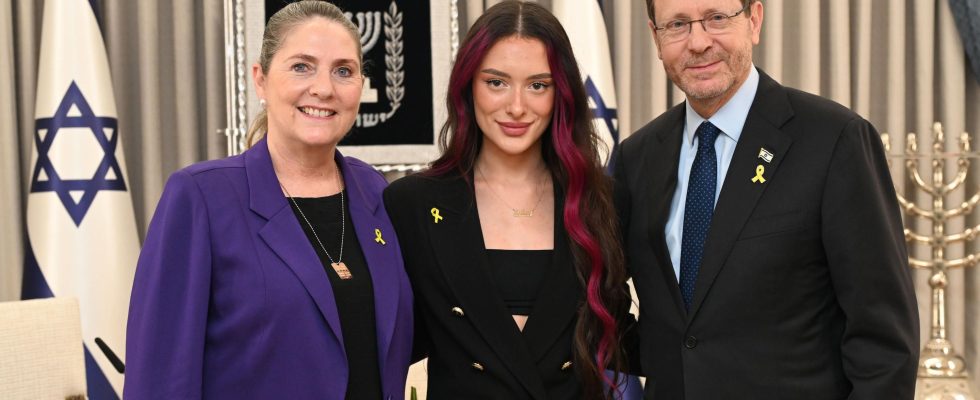In recent days, a slim hope of a military truce between Israel and Hamas in Gaza had the whole world in suspense, when the warning from the Israeli National Security Council came on May 2. In a press release which might make one smile if it did not cover a sad reality, Israeli travelers were warned that Malmö, the Swedish city organizing Eurovision, was moving from level 2 (“potential threat”) to level 3 (“potential threat”) to level 3 (“potential threat”). moderate threat”). “Malmö, which has a high concentration of Syrian, Lebanese, Iraqi and Iranian migrants, is known to be a hotbed of anti-Israeli demonstrations,” points out the text. Israelis were then encouraged to “reconsider the necessity of their trip” during this Eurovision period.
Ayal Gersh, pastry chef in Tel Aviv who works among others at the Swedish embassy in Israel, had to give up this 2024 edition with his partner, due to the recent cancellation of his flight, although booked for a year. “I’m obviously very disappointed,” he confides. “Even if, in the current climate, I wouldn’t really have been able to wave the Israeli flag and be myself in the streets of Malmö.” Ayal will obviously watch Eurovision from Thursday evening, for Israel’s entry into the running. “This year, it is essential for our country to show who we are, assures the pastry chef. In Israel, the heart is not in celebration, but we must compartmentalize.”
An Israeli song that recalls October 7
The performance of Israeli candidate Eden Golan, scheduled for the second semi-final on Thursday May 9 (before the final on Saturday), is eagerly awaited for reasons that no longer have much to do with the artistic dimension. That’s an understatement: at a time when an outbreak of protest over the war in Gaza is sweeping the West, and while a military incursion by the IDF began on the evening of May 6 at the Rafah crossing point, the 2024 edition of Eurovision, a competition dear to Israelis, will take place under high tension.
The Swedish authorities plan to mobilize large police forces to maintain calm in the perimeter, as well as around the demonstration. Eden Golan will benefit, as usual, from the protection of the Israeli security services. But the artist, as well as his delegation companions, was ordered to leave his hotel room only if strictly necessary. On the evening of Sunday May 5, the eve of Holocaust Day, one of the saddest dates on the Israeli calendar, they preferred not to attend the opening festivities of Eurovision to go to a ceremony commemorating the Holocaust, organized by the local Jewish community.
How will the performance of the twenty-year-old Israeli girl, whose song Hurricane (“Hurricane”) ranks 5th in the bets of fans of the competition, and which she performed wrapped in pieces of beige fabric evoking bandages, which recall what the Hebrew State went through on October 7, 2023? One thing is certain: for Israel, participation in Eurovision is historically of particular importance this year, seven months after the Hamas terrorist attacks.
“We had to revise our copy twice so that our song, considered too political, was accepted by the organizers of the competition,” explains Chen Ozeri, sociologist at the Hebrew University of Jerusalem, who works with professor Gad Yaïr, considered to be a global pioneer of academic research around Eurovision As during the second Intifada. [2000-2004], certain voices were raised in the country to indicate that now is not the time for celebrations. But others, aligned with the national public broadcaster KAN, insisted on the contrary on the need for our country, bereaved by the tragedy of October 7, to be present at this meeting and to return to a sort of normality. “
“Israel is one of the success stories of Eurovision. Our country is important in the liberal narrative of the EBU [Union européenne de radio-diffusion, qui organise le concours, NDLR]”, continues Chen Ozeri. And not only since the victory in 1998 of the transgender Israeli artist, Dana International. “As early as 1973, the EBU courted the Jewish state to be part of the competition and it is the first country outside the European area to have joined it, specifies the sociologist. At the time, Israeli governments had a socialist orientation and were very suspicious of popular music.”
Since then, the demonstration has become a tool of international acceptance for Israel. And, at the same time, a platform likely to polarize its detractors. Earlier this year, the EBU rebuffed demands that the Jewish state be excluded from the competition due to military operations in Gaza, rejecting any comparison with Russia. From now on, the organizers especially hope to avoid any spillover of pro-Palestinian mobilization into the competition.
.
